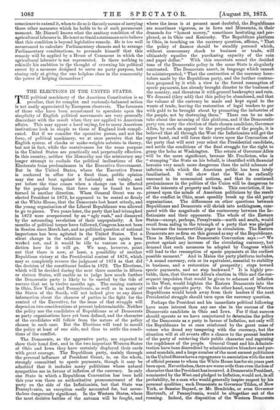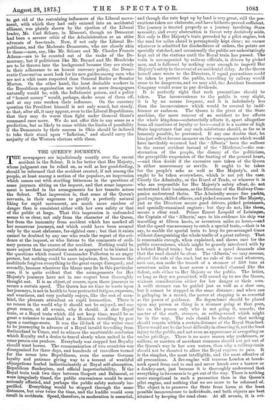THE ELECTIONS IN THE UNITED STATES.
THE political machinery of the American Constitution is so peculiar, that its complex and curiously-balanced action is not easily appreciated by European observers. The forecasts of those who have been accustomed to speculate upon the simplicity of English political movements are very generally discordant with the result when they are applied to American affairs. This may appear a hard saying, for to many American institutions look as simple as those of England look compli- cated. But if we consider the operative power, and not the form, of political machinery, we at once perceive that the English system of checks or make-weights subsists in theory, but not in fact, while the contrivances for the same purpose in the United States are practically and perpetually effective. In this country, neither the Monarchy nor the aristocracy any longer attempt to exclude the political inclinations of the Electorate from predominance in the Executive Government. But in the United States, where the Executive Power is anchored in office for a fixed time, public opinion may rise and beat against it furiously and vainly, and yet before the time comes when a change can be effected by the popular force, that force may be found to have turned in another direction. When General Grant was re- elected President in 1872, he appeared to be seated so firmly at the White House, that the Democrats lost heart utterly, and the young organisation of the Liberal Republicans was allowed to go to pieces. Two years later, the party that had triumphed in 1872 were overpowered by an "ugly rush," and dismayed by the astounding revelation of their unpopularity. A few months of political torpor have followed, Congress has not been in Session since March last, and no political question of national importance has been agitated in the United States. Yet a silent change in the relations of parties has again been worked out, and it would be idle to venture on a pre- diction how far it will go. We may, however, point out that there is now, at least, a possibility of another Republican victory at the Presidential contest of 1876, which may as completely reverse the judgment of 1874 as that did the decision of the constituent bodies in 1872. The Elections, which will be decided during the next three months in fifteen or sixteen States, will enable us to judge how much further the Democratic party is likely to be carried by the tide of success that set in twelve months ago. The coming contests in Ohio, New York, and Pennsylvania, as well as in many of the States of the South, will not indeed give us any direct information about the chances of parties in the fight for the control of the Executive, for the issue of that struggle will -depend on two considerations at present indeterminable. Neither the policy nor the candidates of Republicans or of Democrats as party organisations have yet been defined, and the character of the candidates will follow from the nature of the policy chosen in each case. But the Elections will tend to mould the policy at least of one side, and thus to settle the condi- tions of the conflict.
The Democrats, as the aggressive party, are expected to show their hand first, and in the two important Western States of Ohio and Iowa they have certainly displayed their cards with great courage. The Republican party, mainly through the personal influence of President Grant, is, on the whole, strongly committed to specie payments, though it may be admitted that it includes many politicians whose natural sympathies are in favour of inflation of the currency. In only one State in which a Republican Convention has been held this year was there an authoritative pronouncement of the party on the side of the Inflationists, but that State was Pennsylvania, an exception easily accounted for, but never- theless dangerously significant. In the Western States, where the most decisive battles of the autumn will be fought, and
where the issue is at present most doubtful, the Republicans: are sometimes vigorous, as in Iowa and Minnesota, in their demands for "honest money," sometimes hesitating and per plexed, as in Ohio -and Kentucky. The Republican platform in Ohio, in touching on the currency question, affirms, " That• the policy of finance should be steadily pursued which,, without unnecessary shock to business or trade, will ultimately equalise the purchasing capacity of the coin. and paper dollar." With this uncertain sound the decided tone of the Democratic policy in the same State is singularly contrasted. The Democrats assert, in language which cannot be misinterpreted, "That the contraction of the currency here- tofore made by the Republican party, and the further contrac- tion proposed by it with a view to the forced resumption of specie payments, has already brought disaster to the business of the country, and threatens it with general bankruptcy and ruin.. We demand (they add) that this policy be abandoned, and that the volume of the currency be made and kept equal to the wants of trade, leaving the restoration of legal tenders to par- with gold to be brought about by promoting the industries of the people, not by destroying them." There can be no mis- take about the meaning of this platform, and if the Democratic. party can carry the election of their chosen candidate, Governor Allen, by such an appeal to the prejudices of the people, it is believed that all through the West the Inflationists will get the upper hand, and will force their views upon the Convention of the party that will next year select the Presidential candidate,. and settle the conditions of the final struggle for the right to grasp the helm at Washington. The return of Governor Allen will be the more significant, because Mr. Pendleton, who is " stumping " the State on his behalf, is identified with financial heresies very much more dangerous than the mild schemes of inflation with which the American public has been lately familiarised. It will show that the West is radically unsound in its economical notions, and that its continued. predominance in the politics of the Union will be dangerous to all the interests of property and trade. This conviction, if im- pressed upon the minds of American politicians by the result of the conflict in Ohio, must speedily break up the old party' organisations. The differences on other questions between Republicans and Democrats will shrink into nothingness, com- pared with the magnitude of the controversy between the In- flationists and their opponents. The whole of the Eastern States—except, perhaps, Pensylvania—north and south, would recoil from aiding in the triumph of a party that was pledged to increase the inconvertible paper in circulation. The Eastern Democrats are as firm on this ground as any of the Republicans. Thus in Maryland, the Democratic Convention says :—" We protest against any increase of the circulating currency, but demand that such measures be adopted by Congress which will lead to the resumption of specie payments at the earliest possible moment." And in Maine the party platform includes,. "A sound currency, coin or its equivalent, essential to stability in business, and a restoration of prosperity ; steps toward specie payments, and no step backward." It is highly pro- bable, then, that Governor Allen's election in Ohio and the con- sequent impulsion that would be given to schemes of inflation in the West, would frighten the Eastern Democrats into the ranks of the opposite party. On the other hand, many Western Republicans would break away from their leaders if the next Presidential struggle should turn upon the currency question.
Perhaps the President and his immediate political following have more interest than any one else in the success of the Democratic candidate in Ohio and Iowa. For if that success- should operate as we have conjectured to determine the policy of the Democrats ae a party in favour of Inflation, not only will the Republicans be at once reinforced by the great mass of voters who dread any tampering with the currency, but the' situation will at all events offer a chance to the present leaders of the party of retrieving their public character and regaining the confidence of the people. General Grant and his Adminis- tration have been discredited by administrative blunders and per- sonal scandals, and a large number of the most earnest politicians- in the United States have a repugnance to association with the sort of official persons to whom the White House has for six years past been open. Nevertheless, there are worse evils than even the loss of character that the President has incurred. A Democratic President, nominated by the West and pledged to Inflation, would not, in all probability, be a man who would generally inspire respect by his personal qualities ; such Democrats as Governor Tilden, of New York, or Senator Bayard, or Mr. Hendricks, or even Governor Hartranft, of Pennsylvania, would be altogether out of the running. Indeed, the disposition of the Western Democrats
naturally would be, with the Inflationist poison, and a policy It is perfectly right that such precautions should be of " honest money" would, perhaps, shake some of them off, taken. The inconvenience to the public is very slight, and at any rate weaken their influence. On the currency it is by no means frequent, and it is indefinitely less question the President himself is not only sound, but steady, than the inconvenience which would be created by indif- so that, after all, it may appear, even to the Liberal Republicans, ference or rashness. The Queen is the pivot of the State that they may do worse than fight under General Grant's machine, the mere rumour of an accident to her affects command once more. We do not offer this in any sense as a the whole kingdom—substantially affects it, apart altogether prediction, but as likely to come within the limits of possibility from all emotions of loyalty or love—and it is a matter of high if the Democrats by their success in Ohio should be induced State importance that any such misfortune should, as far as is to take their stand upon " Inflation," and should carry the humanly possible, be prevented. If any one doubts that, let































 Previous page
Previous page